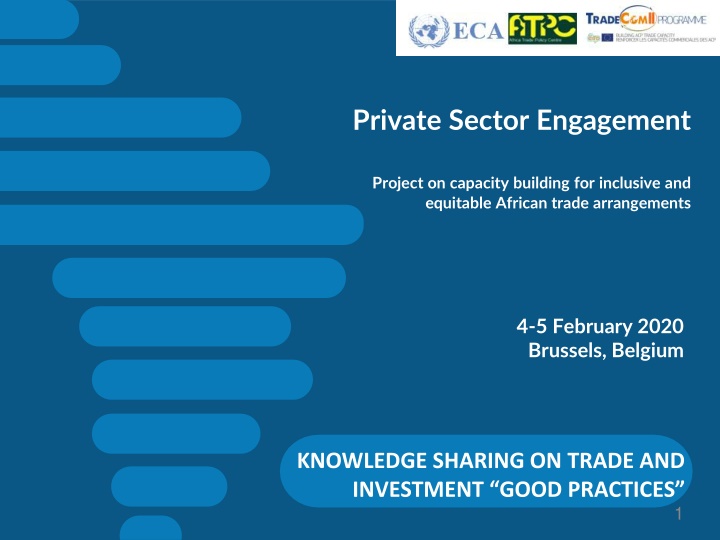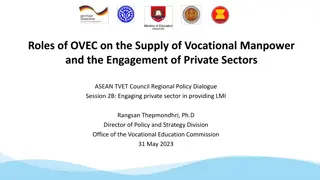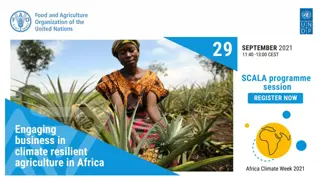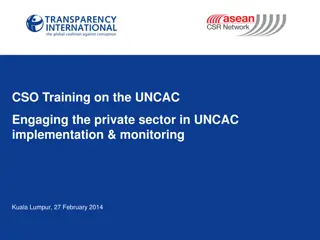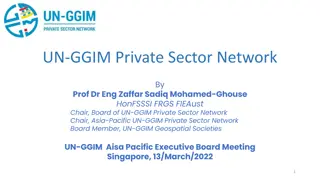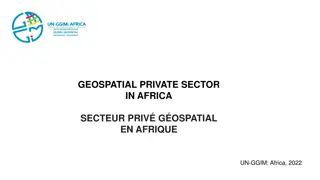Private Sector Engagement
This project in Brussels, Belgium on 4-5 February 2020 focuses on sharing knowledge about trade and investment good practices for enhancing African trade arrangements through private sector engagement. Participants will engage in capacity building activities to foster inclusivity and equity in trade relations.
Download Presentation

Please find below an Image/Link to download the presentation.
The content on the website is provided AS IS for your information and personal use only. It may not be sold, licensed, or shared on other websites without obtaining consent from the author.If you encounter any issues during the download, it is possible that the publisher has removed the file from their server.
You are allowed to download the files provided on this website for personal or commercial use, subject to the condition that they are used lawfully. All files are the property of their respective owners.
The content on the website is provided AS IS for your information and personal use only. It may not be sold, licensed, or shared on other websites without obtaining consent from the author.
E N D
Presentation Transcript
Private Sector Engagement Project on capacity building for inclusive and equitable African trade arrangements 4-5 February 2020 Brussels, Belgium KNOWLEDGE SHARING ON TRADE AND INVESTMENT GOOD PRACTICES 1
2 Project Summary Capacity building for inclusive and equitable African Trade Arrangements Title of the action: ECA Member Countries, CP countries 24 months 2,578,767 Euro Location(s) of the action: Total duration of the action: Requested EU contribution (amount) Requested EU contribution as a percentage of total eligible costs of the action (indicative) Objectives of the action 80% Overall objective: Contribute to enhancing Intra-African trade and Africa s share of global trade. Specific objective: A more inclusive trade policy making process and higher returns from trade for African countries African governmental institutions, African Regional Economic Communities, African private sector institutions Public and private sector of Africa Outcome 1. Strengthened capacity of policymakers for adoption of inclusive and equitable trade policies. Target group(s) Final beneficiaries Estimated results Outcome 2. Increased capacity of African private sector to take better advantage of preferential trade agreements/arrangements. - - - Trade policy research on intra-Africa and intra-ACP and Africa-EU trade. Main activities Technical assistance in external trade policy and strategy development. ATPC 2018 Financial Report | Receivables UNECA.ORG Capacity-building of African private sector and national trade support institutions to take advantage of RTAs.
Background Private sector engagement in trade issues is lower in African countries than it is in developed countries. Businesses currently face many constraints, including high trade costs, divergent regulatory frameworks and governance issues that undermine their effective operations on the African continent. Some countries in Africa are doing better than others, but generally, levels of engagements are increasing. Although governments negotiate trade agreements, preference utilisation is driven by the private sector in the export of goods and services. Some sectors have more opportunities for inclusion than others and the private sector has to be engaged and empowered to better understand how to implement trade agreements in ways that create gainful trade opportunities. In African most countries, businesses lack access to trade and market information. Implementation of this project, with support from the ACP, aims to build the capacity for inclusive and equitable trade targeting policy makers and the private sector to increase the capacity of African private sector to take better advantage of preferential trade agreements and arrangements. This Project is part of a broader program of the ECA/ATPC that aims to boost intra African trade and accelerate private sector development. UNECA.ORG
Project interventions Key studies i) the African private sector to take better advantage of e-commerce in preferential trade agreements and arrangements-EAC. Study on E-Commerce Provisions in PTA s to strengthen the capacity of ii) traders with a view to strengthen the capacity of both private and public sector actors to support informal traders. This will help to better tap into preferential market access opportunities and gradually formalize trade, with a focus on ECOWAS; Study on Extending the benefits of free trade to informal cross-border iii) strengthen the capacity of the African private sector to better engage in the negotiation and implementation of preferential trade agreements and arrangements, and particularly those relating to trade in services, with focus on ECCAS; Study on Negotiating Institutions: Putting in the Right Foundations to UNECA.ORG
Project interventions Key studies iv) capacity of the African private sector to comply with and take better advantage of preferential trade agreements and arrangements (emphasize on TBT and SPS), focusing on Southern Africa. Study on Preferential Trade Agreement Compliance to strengthen the v) vulnerable groups within the private sector, the constraints they face, and where support to improve the use of PTAs should be prioritized, with continental focus. Study on PTA utilization by the private sector in Africa, and particularly Studies will highlight good practices for private sector engagement in Africa; Form the basis for the design of capacity building programmes for the private sector UNECA.ORG
Private Sector Engagement Initiatives The Africa Business Forum (annual) brings together heads of states, policymakers, industry leaders, and private businesses to discuss the role of private sector in Africa s development; focuses on the issues, challenges and opportunities that are most relevant for African economies and societies, provides a unique networking environment for policymakers, private sector, financiers, academia and civil society. Intra-African Trade Fair (IATF) ECA partners with Afreximbank and African Union Commission provides trade and market information connect buyers and sellers from across the continent and provide opportunities for matchmaking, business exchanges and conclusion of business and investment deals Next IATF on 1-7 September 2020, in Kigali Rwanda UNECA.ORG
Private Sector Engagement Initiatives The African Continental Free Trade Area (AfCFTA) Business Index The index aggregates the opinions of businesses in Africa and articulates them in an index to ensure that the AfCFTA responds to their interests. It identifies the actual effect that the AfCFTA has on business, and challenges countries to respond to improve the trading environment. Star performing countries are recognized for their efforts, while those lagging behind are identified and flagged. UNECA.ORG
8 Methodology of implementation PROJECT OUTCOMES Policy reforms Private Sector engagement Increased trade Increased capacity and skills of policy makers to develop and implement inclusive policies to increase trade, gender and youth sensitive Increase utilisation of preferences in FTAs by the private sector Policy briefs, training programmes for policy makers and private sector , policy dialogues, technical assistance, etc. PROJECT OUTPUTS Studies (private sector, Regional FTA s & EPA issues) Capacity Building (tailored) >125 people participants Validation of Studies to ensure that they respond to specific issues in the regions Working with RECs and Private Sector Policy Briefs Inclusion & equity issues 5 Regional studies on E-commerce, Trade Institutions, Informal Cross border Trade, Standards and PTA utilisation Partnerships with IDEP, SRO s, TRALAC and TRAPCA Technical Assistance UNECA.ORG
9 Key considerations Studies will shape and inform the content of the trainings and capacity building programmes for policy makers and the private sector; Focus is to ensure that our efforts results in policy reforms and increased trade flows; ECA has other initiatives that are supporting African member States in developing national AfCFTA implementation Plans; ECA is implementing other initiatives that are aimed at collecting gender disaggregated data- supporting and enabling evidence-based policy making; UNECA.ORG
ECA THANK YOU! more info: bchikwene@un.org UN.ORG
